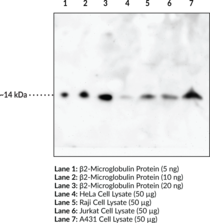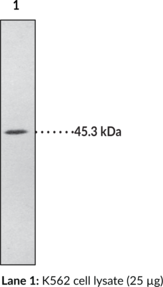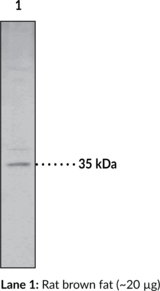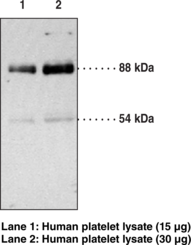Description
β2-Microglobulin is a 99-amino acid protein and the light chain component of major histocompatibility complex (MHC) class I molecules.{45065} It is non-covalently associated with the MHC class I α chain and comprises a protein-building subunit of the MHC class I molecule to facilitate complex transport to the cell surface and antigen presentation to cytotoxic T cells. β2-Microglobulin is found in cells, as well as in extracellular fluids, including urine and serum, and MHC class I-associated β2-microglobulin exhibits dissociation and equilibrium exchange with circulating soluble β2-microglobulin. Serum levels of β2-microglobulin are increased in patients with renal failure, systemic amyloidosis, various autoimmune diseases, including multiple sclerosis, chronic infections, and a variety of cancers.{45065,45066,45067,45064} It mediates signaling pathways that promote cellular growth, angiogenesis, epithelial-mesenchymal transition (EMT), and bone metastasis and is used as a predictive biomarker of survival in multiple myeloma and colorectal cancers.{45065} Cayman’s β2-Microglobulin Polyclonal Antibody can be used for Western blot and ELISA applications. This antibody recognizes β2-Microglobulin at ~13.7 kDa from human samples.
Synonyms: β2-M Polyclonal Antibody
Immunogen: Human β2-microglobulin protein
Formulation: 500 µg of Protein A-purified antibody
Isotype:
Applications: ELISA and WB
Origin:
Stability: 365 days
Application|ELISA||Application|Western Blot||Product Type|Antibodies|Polyclonal Antibodies||Research Area|Cancer|Cell Migration & Metastasis||Research Area|Immunology & Inflammation|Adaptive Immunity||Research Area|Immunology & Inflammation|Autoimmunity||Research Area|Neuroscience




